Mahabharata is a literary as well as historical treasure of India. It is the longest epic poem in the world, originally composed in Sanskrut, by Sage Vyas several thousand years ago.
Mahabharata belongs not only to India but to the world too. The central theme is that ‘victory comes to those who stay on the righteous path’. It has the much revered Bhagavad Geeta, Bhagwan ShriKrushna’s teachings to his dearest disciple Arjuna. The Bhagavad Geeta provides perennial spiritual strength to the people of India in all phases of their lives.
The Mahabharata stories presented here are in chronological order and are aimed to provide a fair amount of knowledge to your children. This is a universal book and is of great use to every person irrespective of his religion, caste or creed.
King Dushyant, a powerful ruler in ancient India. Dushyanta married Shakuntala, the foster-daughter of Kanva rushi. Shakuntala was born to Menaka (an Apsara) of Indra’s court, and Rushi Vishwamitra. Shakuntala gave birth to a worthy son Bharata, who grew up to be fearless and strong. He ruled for many years and was the founder of the Kuru dynasty. It is after this Bharata that our country gets the name ‘Bharat’. Unfortunately, things did not go well after the death of Bharata and his large empire was reduced to a kingdom of medium size with its capital in Hastinapur.
Mahabharata means the story of the descendants of Bharata. The regular saga of the epic of the Mahabharata, however, starts with king Shantanu. Shantanu lived in Hastinapur and was known for his valor and wisdom.
One day Shantanu went out hunting to a nearby forest. (You might wonder that how hunting was allowed then, as hunting is strictly prohibited now. Children do not forget that this story is of ancient times and that time people were righteous and abiding Dharma. One of the duties of the king in those times was to keep a check on the population of wild animals in the forests. Therefore they could hunt animals. Due to the greediness and selfishness of people many species of animals have become extinct now. So all the animal species that still exist have to be protected. The number of tigers also is dwindling now; so nowadays great care is taken to stop the killing of wild animals.
The aim behind telling this story of Mahabharata to you is that you also should understand the importance of righteous behaviour which will make you happy in life. So please pay attention to every aspect that is covered in this story. You can put into practice all the virtues that you will come across as we proceed with the story.)
So while hunting king Shantanu reached the banks of the river Ganga and there he saw a very beautiful lady appearing out of the water and walking on its surface. Her grace and Divine beauty struck Shantanu at the very first sight and he was completely spellbound. When the king inquired who she was, the lady curtly asked, “Why do you wish to know that?” Shantanu admitted that he was captivated by her Divine beauty and wished to marry her. He also introduced himself stating that he was Shantanu, the king of Hastinapur.
The lady said, “I can accept your proposal provided you are ready to abide by two conditions.” The king asked her anxiously, “What are they?”
“Firstly, you will never ask anything about my personal life, like who I am or where do I come from?
Secondly, you will never stop me from doing anything or ask the reason for anything I do.”
Shantanu was so much fascinated by her beauty that he immediately accepted the conditions. She was now known as Ganga. They instantly got married and returned to Shantanu’s palace. In the beginning everything was very smooth and one day queen Ganga gave birth to a lovely boy. As soon as king Shantanu heard of this good news, he was overjoyed and rushed to the palace to congratulate the queen. But he was astonished when he saw that the queen took the newborn into her arms, went to the river, and drowned him. The king was shocked and felt miserable, yet he could not ask the queen about her action. He was bound by his pledge, not to question or interfere with her actions.
Hardly had Shantanu recovered from the shock of the death of his first son at the hands of the queen when she became pregnant again. The king felt happy and thought that the queen would not repeat her dreadful action. But the queen again took the newborn into her arms, and drowned him in the river.
After seeing the ghastly action of the queen, the king was in immense grief but his pledge barred him from saying anything.
This continued until queen Ganga bore the eighth son and marched to the river as before. Shantanu lost his patience and as soon as the queen was about to drown the newborn, Shantanu stopped her. “I have lost seven sons like this and am left with no heir. I can no longer stand to see my flesh and blood decimated before my eyes.”
Queen Ganga turned around and said, “Oh King, you have violated your pledge. I will not stay with you any longer. However before leaving you, I will open the secret that led to the death of your seven sons. Once it so happened that the saint Vashishtha got offended with eight gods known as Vasus (Deities of directions). He cursed them to be born as human beings on earth and undergo the mental torture of being a human. Hearing this, seven of the Vasus implored the saint to be excused but the eighth one, who was the most mischievous, kept standing rudely. ”
Vashishtha was appeased and modified his curse, “Seven of you will die and come back to heaven as soon as you are born, but the eighth one will have to live on earth for a long period and face tribulations as a human.”
Ganga continued, “Upon the request from the Vasus, I had assumed human form and had married you. My job is now over and I must now go back to my heavenly abode. I am taking your eighth son with me and will bring him back to you after he is amply grown up.”
After saying this, Ganga flew away into the sky along with the newborn. King Shantanu felt very disappointed and returned to his palace with a broken heart. Here ends chapter one of Mahabharata.
Dear children, are you curious to learn what happened to King Shantanu’s son? Before we get to that, from this chapter we can realise how glorious our history is ! Our ancestors were such staunch followers of Dharma even in adverse conditions! We will be seeing more examples of this in the following chapters.
To read the second chapter – Click here !

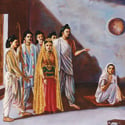 Arjuna’s exile
Arjuna’s exile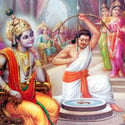 Draupadi Swayamvar
Draupadi Swayamvar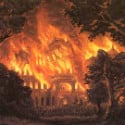 Escape from lakshagriha !
Escape from lakshagriha !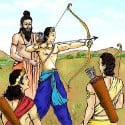 The Princes grow up!
The Princes grow up!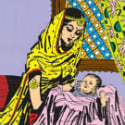 Birth of Pandavas and Kauravas
Birth of Pandavas and Kauravas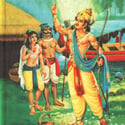 Devavrata becomes Bhishma!
Devavrata becomes Bhishma!